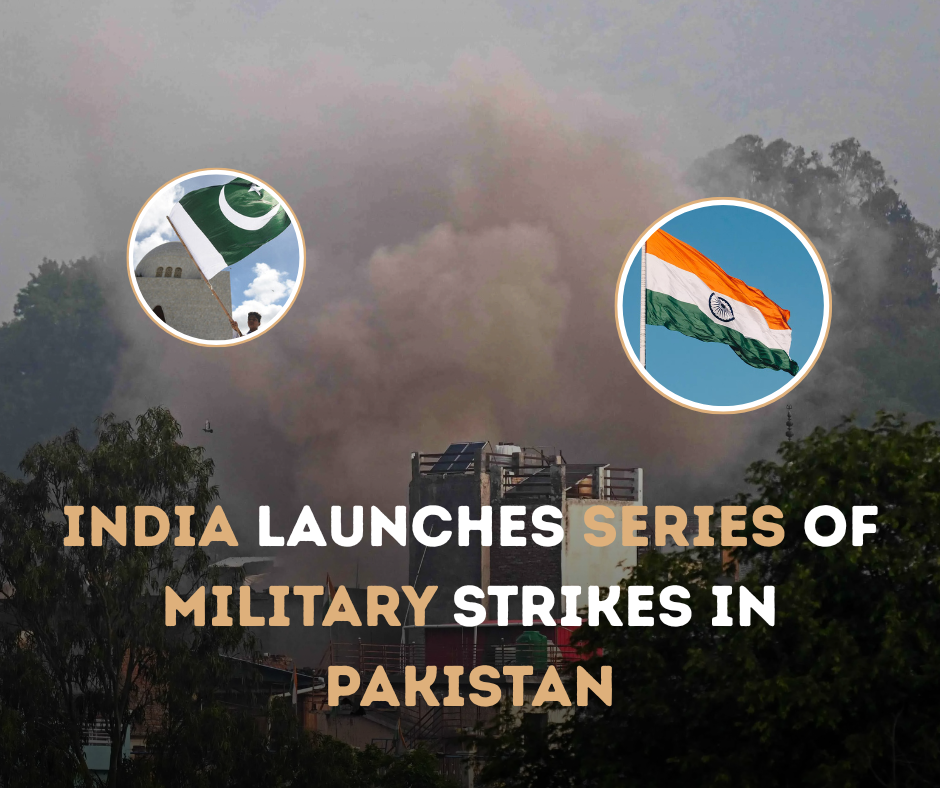In a significant escalation of tensions between India and Pakistan, the Indian military has launched a series of airstrikes and ground operations targeting strategic locations within Pakistani territory. These strikes, which began on May 9, 2025, have raised alarms worldwide, with leaders and analysts closely monitoring the situation.
The Events Leading Up to the Strikes
The conflict between India and Pakistan has a long and complex history, marked by territorial disputes, particularly over the Kashmir region. Despite several diplomatic efforts to ease tensions, the relationship between the two nuclear-armed nations has remained fragile, with occasional flare-ups of violence along their shared border.
In the days leading up to these recent strikes, reports indicated an increase in military activity along the Line of Control (LoC), the de facto border dividing Indian-administered and Pakistani-administered Kashmir. Both nations had exchanged accusations of ceasefire violations, and intelligence reports suggested heightened militant activity in Pakistan-administered Kashmir, which India claims is a launchpad for insurgency in its territory.
India’s Official Statement
India’s government has officially confirmed that the strikes were aimed at militant camps and infrastructure used by separatist groups in the region. According to Indian military spokespeople, the strikes were conducted with the objective of neutralizing threats to India’s national security and preventing cross-border terrorism. The government has also made it clear that these strikes were not an attack on Pakistan itself, but rather a defensive action aimed at countering terrorism.
“The operations were carried out with precision, targeting militant facilities, and are part of our ongoing efforts to protect our sovereignty and ensure the safety of our citizens,” stated a senior Indian defense official.
The Pakistani Response
Pakistan’s military has condemned the strikes, calling them a violation of its sovereignty. In a statement issued shortly after the strikes, Pakistan’s armed forces declared that they would take “all necessary measures” to protect their borders and citizens. There have been reports of retaliatory artillery fire along the LoC, but both sides have refrained from escalating into full-scale combat—at least for now.
The Pakistani government has also called for an emergency session of the United Nations Security Council, seeking international intervention to de-escalate the situation. In contrast, India has insisted that its actions were justified and part of its ongoing anti-terrorism operations.
International Reactions
The international community has expressed deep concern about the potential for the conflict to spiral into a wider war between two nuclear powers. While several nations have called for restraint, diplomatic sources suggest that behind-the-scenes efforts are underway to prevent a broader military confrontation.
The United States, China, and Russia—key players in South Asian geopolitics—have called for both countries to engage in dialogue and reduce military tensions. The United Nations has urged both India and Pakistan to respect international law and the ceasefire agreements along the Line of Control.
The Risk of Escalation
Given the history of military confrontations between India and Pakistan, there is widespread concern that this latest round of strikes could escalate into full-scale conflict. Both nations possess nuclear weapons, and any significant escalation could have devastating consequences not only for the two countries involved but for regional and global security.
Military analysts are closely watching the situation, particularly the response of Pakistani forces and whether the strikes will provoke further retaliatory actions. The next few days will be critical in determining whether the situation can be contained or if tensions will continue to rise.
What This Means for the Region
The region is already grappling with numerous challenges, including political instability, terrorism, and economic pressures. The conflict between India and Pakistan, if left unchecked, could have significant humanitarian and economic repercussions. Additionally, many nations are concerned about the impact on the broader South Asian economy, as both countries are key players in the region’s trade and security.
For ordinary citizens in both countries, the growing tensions are a source of fear and uncertainty. Many people in the border areas have already been displaced due to the ongoing conflict, and there are concerns about the humanitarian impact of a prolonged military engagement.
As India and Pakistan brace for what could be a tense and volatile period, much will depend on the actions of their respective leaders in the coming days. Diplomatic efforts will be crucial in averting further violence and ensuring that the situation does not escalate into a full-blown conflict.
The international community’s role in encouraging dialogue and reducing military tensions will be pivotal in the coming days. Both nations must find a way to address their longstanding issues through peaceful negotiations rather than military confrontation.

Leave a Reply